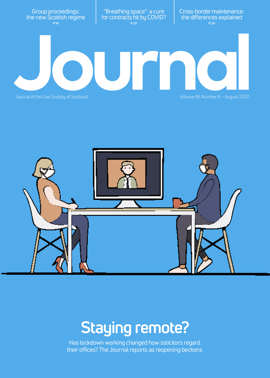Relevant persons: the final word?

The vexed question as to who can fall within the definition of a relevant person (in terms of s 81(1) of the Children’s Hearings Scotland Act 2011) was an interesting subject that formed my first article with the Journal back in November 2014, and a notable number since. Since then there has been a steady flow of reported appeals in this regard. However, the UK Supreme Court pronounced judgment in the recent decision of ABC v Principal Reporter [2020] UKSC 26 (18 June 2020). There are a number of interesting observations that arise from the judgment.
The court was invited to consider two appeals, brought by ABC and XY. Both appeals had been dismissed by the Inner House of the Court of Session.
ABC had a younger brother who was subject to a compulsory supervision order that regulated his contact with ABC. ABC did not have the status of a “relevant person” and therefore did not have the rights that he would have had as such. ABC lodged a petition for judicial review with the Court of Session. In short compass, the Inner House rejected the contention, upheld by the Lord Ordinary, that there was a requirement to read down the provisions of s 81(3) of the 2011 Act, setting out who should be deemed to be a relevant person, to include the words “or persons whose established family life with the child may be interfered with by the hearing and whose rights require the procedural protection of being a relevant person”.
XY had three siblings who were all subject to a compulsory supervision order. The CSO, inter alia, regulated XY’s contact with his three siblings. XY was not afforded relevant person status (although it appears he was for a period of time), and thus argued that the provisions of the 2011 Act were in contravention of his article 6 and article 8 rights under the European Convention on Human Rights. The Inner House dismissed his appeal.
Important, but...
At the outset, the Supreme Court noted the importance of siblings in terms of their relationship to each other. The court observed (at para 1): “Siblings can be as important as parents in the lives of those who have them. While parents have been likened to the doctors doing their ward rounds to see the bigger picture, siblings have been likened to the nurses: they are there every day. ‘These siblings are often “fellow travellers” through adversity or significant life events; they can act as a source of support for some children and a source of conflict for others. For these reasons, siblings are a potentially powerful influence on development…’ (White & Hughes, Why Siblings Matter: The Role of Brother and Sister Relationships in Development and Wellbeing (2018)).”
We are told later in the judgment that the importance of sibling relationships is not in dispute. The court however suggested that cases involving sibling contact were very few and far between.
Despite the court making so many concessions, a line appears to have been drawn. The core of the ruling can be found at para 45, where the court accepts that the decision of Principal Reporter v K [2010] UKSC 56; 2011 SC (UKSC) 91, relied on by the Lord Ordinary, was only intended to apply to unmarried fathers and to a limited class of others with a significant involvement in the upbringing of the child. We are told further that this was subsequently enacted in the test set out in s 81(3) of the 2011 Act.
Further considerations
The court also appeared to be anxious to explain why it would not be appropriate for every sibling to be afforded relevant person status. First of all, there a duty to attend panel and court hearings. The failure to do either could result in criminal sanctions being taken against the relevant person. While there is no doubt the court is quite correct about that, I would add that from my own experience, reporters appear to be disinclined to seek warrants from panels – especially in respect of a young, vulnerable person.
To be fair, the court stated further reasons why it would not be appropriate to afford a sibling relevant person status. A relevant person has the power to accept or not to accept grounds of referral. If there were a number of relevant persons, or alternatively, more than necessary, this could result in disruptive referrals to the sheriff. However, even if that is correct, it is not particularly common for relevant persons to accept the whole of the supporting facts pertaining to the grounds. In such case, it is quite proper for the matter to be remitted to the sheriff for proof.
Admittedly, having a larger number of relevant persons than would otherwise be accepted could theoretically result in a larger number of attendees at panel hearings. That would be undesirable for a number of reasons. Reporters are duty bound to keep numbers to the minimum. At the moment, there does appear to be a very strong emphasis on that point by virtue of hearings operating by means of the Vscene mobile app.
That in itself generates another issue which the court was anxious to point out. It observed that relevant persons have “comprehensive access” to papers, documents and reports about the child. Normally, these reports (which are mostly prepared by the social work department) are fairly detailed and chronicle much of the history of the family and the background. Given that confidentiality is of the utmost importance in the context of panels, it would be most undesirable for people who may not otherwise be entitled to it to have access to that information. And that in turn appears to have been a significant point that the court founded on. At para 50, the court specifically pointed to the “dissemination of sensitive information” as being a significant factor against the proposed reading down of the definition of a relevant person.
Bespoke to the case
The court broadly concluded the case by stating that it was necessary to have a “bespoke enquiry”, and that it was important that the public authorities concerned were aware of the interests of the child; the onus fell on such authorities to ensure that the child’s interests were being met. We are not told of course what is meant by a “bespoke enquiry”. I would take it to mean that we should avoid any sense of generic hearings, or perhaps simply rubber stamping decisions without first properly considering matters. In any event, it is apparent from the court’s attitude that the onus lies firmly on the public authorities to exercise good and sensible judgment. By implication therefore, the onus appears to rest firmly upon Children’s Hearings Scotland, the appropriate implementation authority, and Scottish Children’s Reporter Administration.
But the main challenge here, as I see it, is leaving too much in the hands of panel members. It was quite properly accepted by the court that panel members are not lawyers. They are not legally qualified. Therefore, this will continue to present challenges in terms of future panel hearings where the issue of relevant persons will arise. It is appreciated and accepted that panels by their own nature are not intended to be legalistic and should focus on the interests of the child. Nonetheless, one should not underestimate the importance of ensuring that as a decision-making body, they produce decisions that are lawful.
Looking forwards, there is no doubt that the question whether a person is or should be a relevant person will continue to surface in cases. The answer to clients as to whether they meet the criteria will not always be straightforward or clear cut. One might hope that the position of siblings in the context of relevant person status has now been clarified. But then again, if in this matter we are required to have bespoke hearings, the advice will have to be just that. Bespoke.
Regulars
Perspectives
Features
Briefings
- Criminal court briefing: Coronapocalypse?
- Employment: Unfairly anonymous?
- Family: When experts miss the mark
- Human rights: Judicial review refusal does not need oral hearing
- Pensions: Members' benefits: compensation and protection action
- Scottish Solicitors' Discipline Tribunal
- Property: Code to recovery
- In-house: “So, how are you?”






